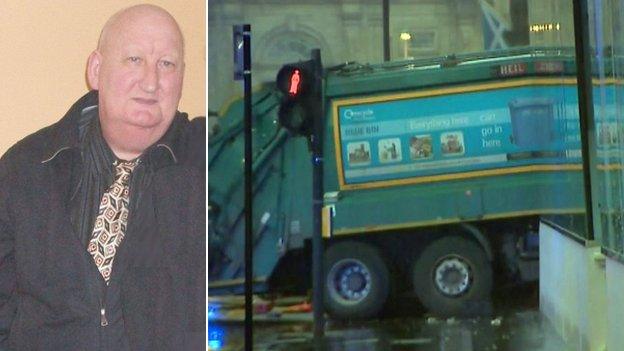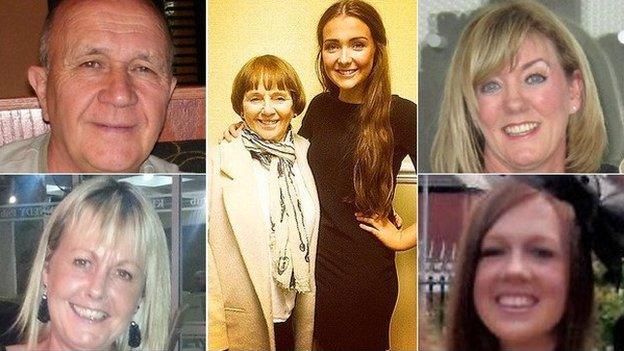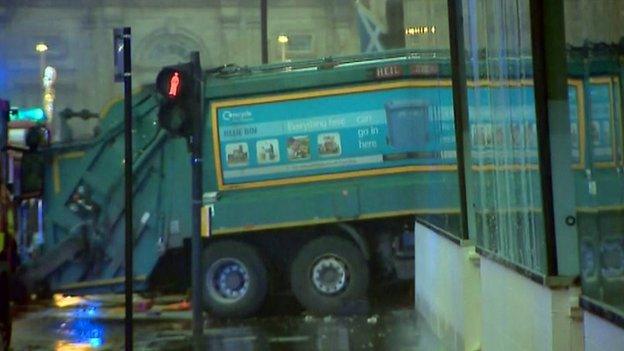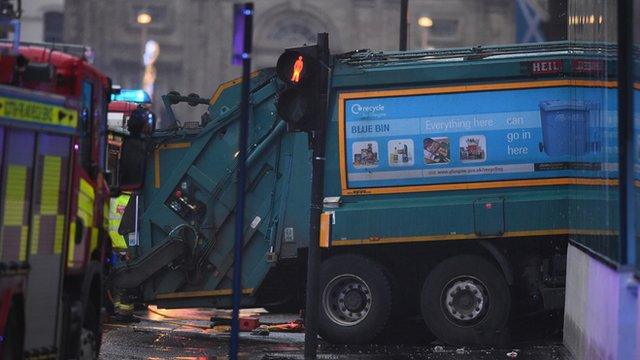Glasgow bin lorry crash: Families intend to prosecute driver
- Published

The inquiry has heard Mr Clarke was unconscious when the bin lorry crashed, killing six people
The families of two women who died in the Glasgow bin lorry crash have told an inquiry they intend to seek a private prosecution against the driver.
Jacqueline Morton's family have sought an adjournment so they can begin action against 58-year-old Harry Clarke.
The motion is being backed by relatives of Gillian Ewing. Both women were among the six people who died in the crash on 22 December last year.
A decision on whether the inquiry will be halted will be made on Thursday.
Erin McQuade, 18, and her grandparents Jack Sweeney, 68, and Lorraine Sweeney, 69, also died in the tragedy.
Their lawyer, Mark Stewart QC, said they reserved the right to prosecute anyone found to carry responsibility for the crash.
'Not a crime'
Relatives of a sixth victim, 29-year-old Stephenie Tait, said they would not be involved in any private prosecution.
Their lawyer Ronald Conway told the inquiry: "Telling lies is not a crime; telling lies to the medical profession is not a crime."
The inquiry, now in its fifth week at Glasgow Sheriff Court, will hear from the remaining witnesses before the sheriff makes a decision on the request for an adjournment on Thursday.
The inquiry is looking at Mr Clarke's health, the bin lorry and its route.
The FAI has previously heard that Mr Clarke was unconscious at the wheel when the Glasgow City Council bin lorry crashed on 22 December last year.

(Clockwise from top left) Jack Sweeney, Lorraine Sweeney, Erin McQuade, Jacqueline Morton, Stephenie Tait and Gillian Ewing were killed in the crash
The inquiry has also heard that he suffered a previous blackout in 2010 at the wheel of a bus, while employed as a driver for First Bus.
In the past four weeks, the FAI has been told that Mr Clarke lied about the circumstances surrounding the 2010 blackout in his council application form, subsequent health assessments and in dealings with the Driver and Vehicle Licensing Agency (DVLA).
Scotland's Crown Office stated in February that it would not bring criminal proceedings against Mr Clarke over the incident, which it said was a tragic accident.
The Crown Office later clarified at the inquiry that this decision stood, even after it had emerged at the FAI that Mr Clarke may have lied about the state of his health to obtain driving jobs.
Some families have been highly-critical of the decision not to prosecute Mr Clarke and have stated they would consider a private prosecution against him.
On Monday, the first move towards a private prosecution began at the inquiry.

What does a private prosecution involve?
In Scotland, prosecutions are normally brought by the Lord Advocate, who heads the Crown Office.
Private prosecutions are extremely unusual, with only two in the 20th Century.
To bring one, an individual must apply to the High Court for a "Bill of Criminal Letters," which can be opposed by the Lord Advocate - and the alleged offender.
If the court grants the application, they have 21 days to lodge answers, after which a hearing is fixed for a later date to decide whether the prosecution can proceed.
At each stage there is the possibility of an appeal, which makes the process extremely costly as legal aid would not be available for an individual bringing a case.
The last private prosecution was the so-called Carole X case in 1982 in which defence lawyers gave their services pro bono - free of charge.
A Glasgow woman prosecuted three men who she claimed had raped her. One was found guilty.
The other case was in 1909, and involved a coal company and allegations of fraud.

Dorothy Bain QC, acting for the family of Ms Morton, from Glasgow, told Sheriff John Beckett she had been instructed to seek an adjournment in order to seek authority to bring a private prosecution against Mr Clarke.
Ms Bain said it could take up to three months to establish whether a private prosecution could proceed.
Alistair Forsyth, acting for the bereaved Ewing family, supported Ms Bain's motion.
Ronald Conway, representing the Tait family, said they would not be pursuing a private prosecution as the family felt that the inquiry should focus on the "systemic failures which have been made plain" during the course of evidence.
'Profound implications'
Mr Clarke's advocate, Ronnie Clancy QC, said the driver supported the motion to adjourn, but stressed that he was keen to return to the inquiry to give evidence once the issue of legal proceedings had been resolved.
Solicitor General Lesley Thomson QC, who is leading the inquiry, said there was a "clear public interest" in seeing the inquiry through to the sheriff's determination.
Sheriff Beckett said that if Mr Clarke was going to be prosecuted then he would have to be given a warning before giving evidence, meaning he may not answer all questions.
He also said there would be "profound implications" in adjourning the inquiry but he would consider the motion and the inquiry would hear the evidence of the other remaining witnesses in the meantime.
This means that Mr Clarke, who was expected to begin giving evidence on Tuesday, will not appear until Thursday at the earliest.
The inquiry continues.
- Published13 August 2015

- Published7 August 2015

- Published29 July 2015

- Published23 July 2015
